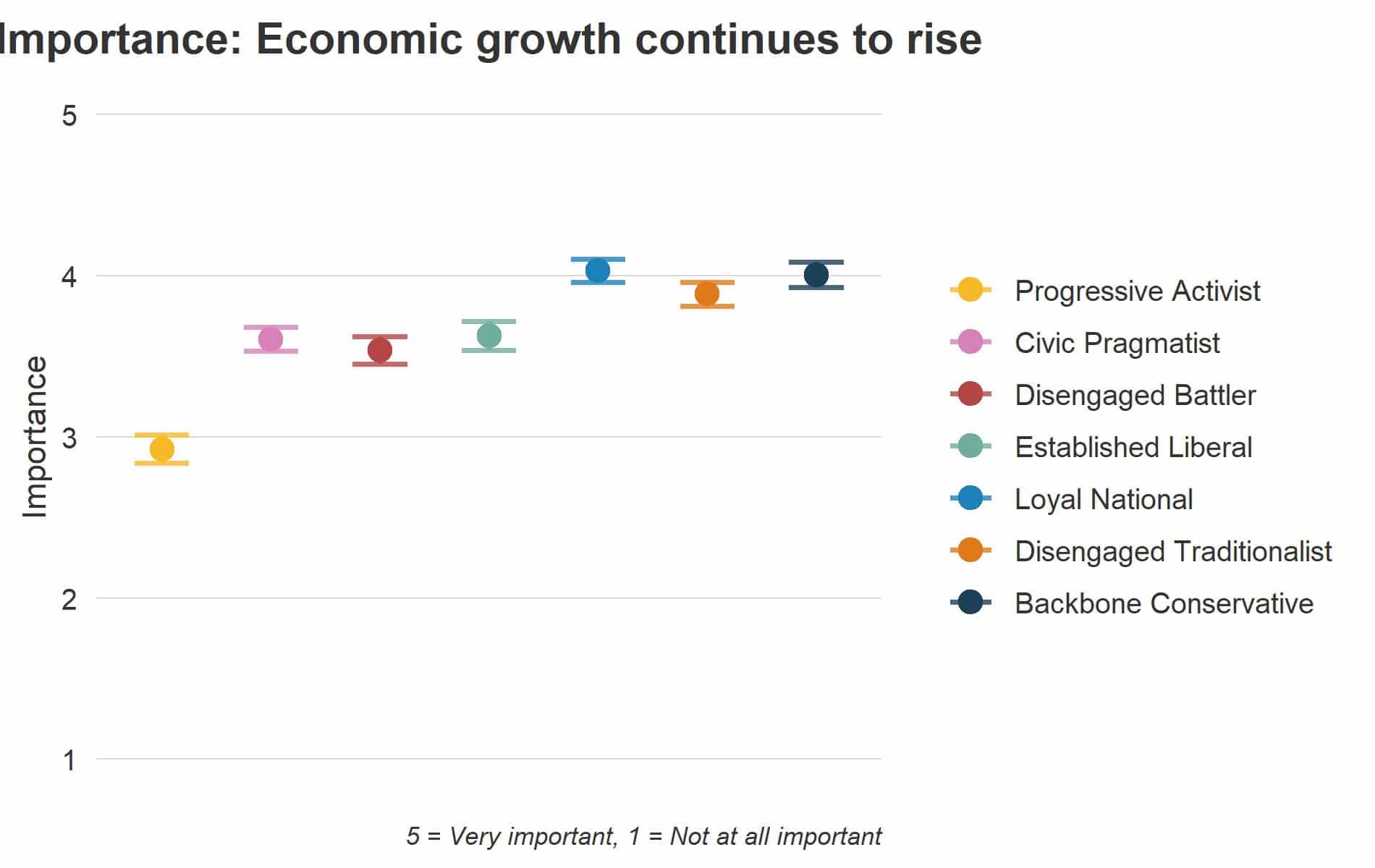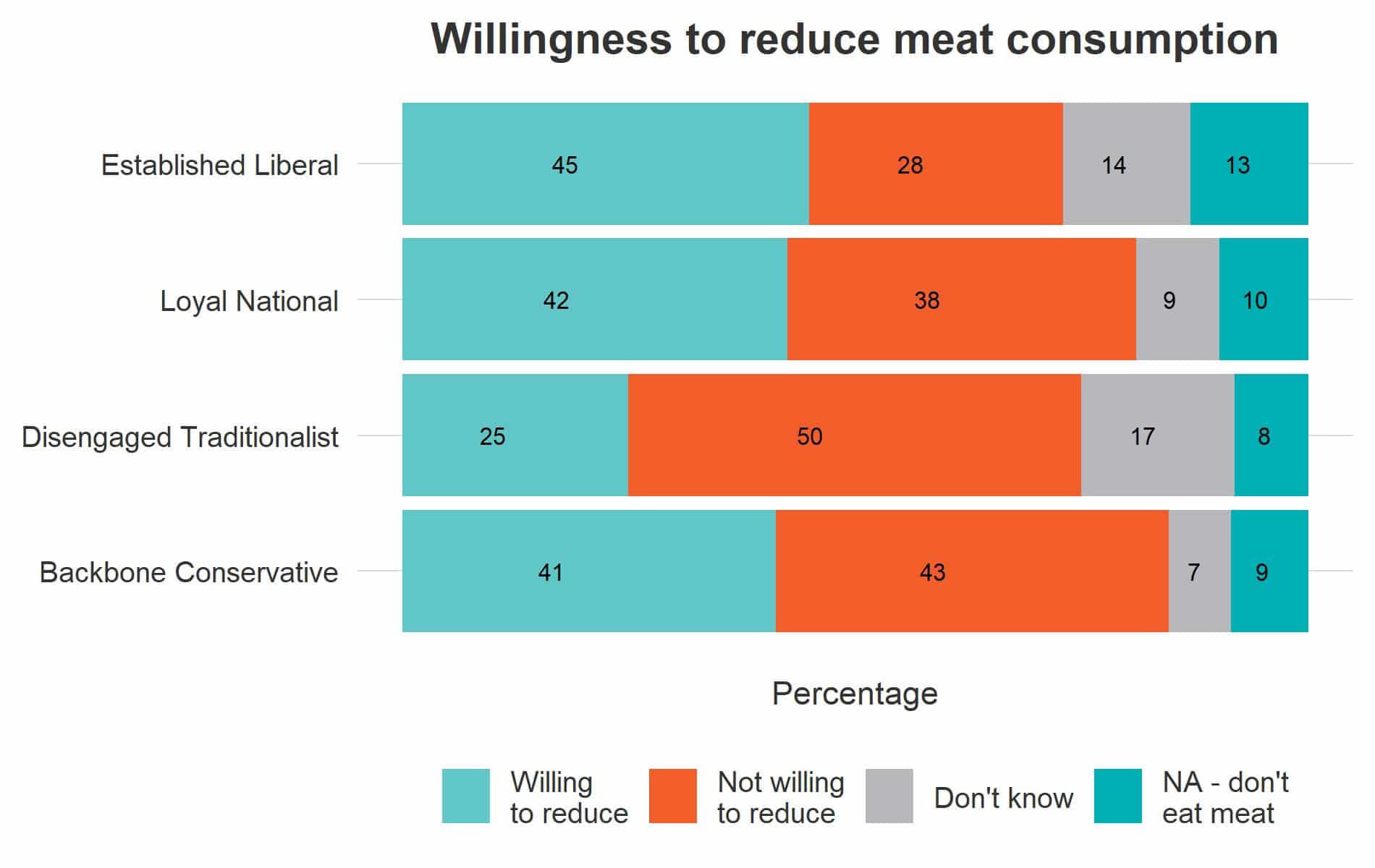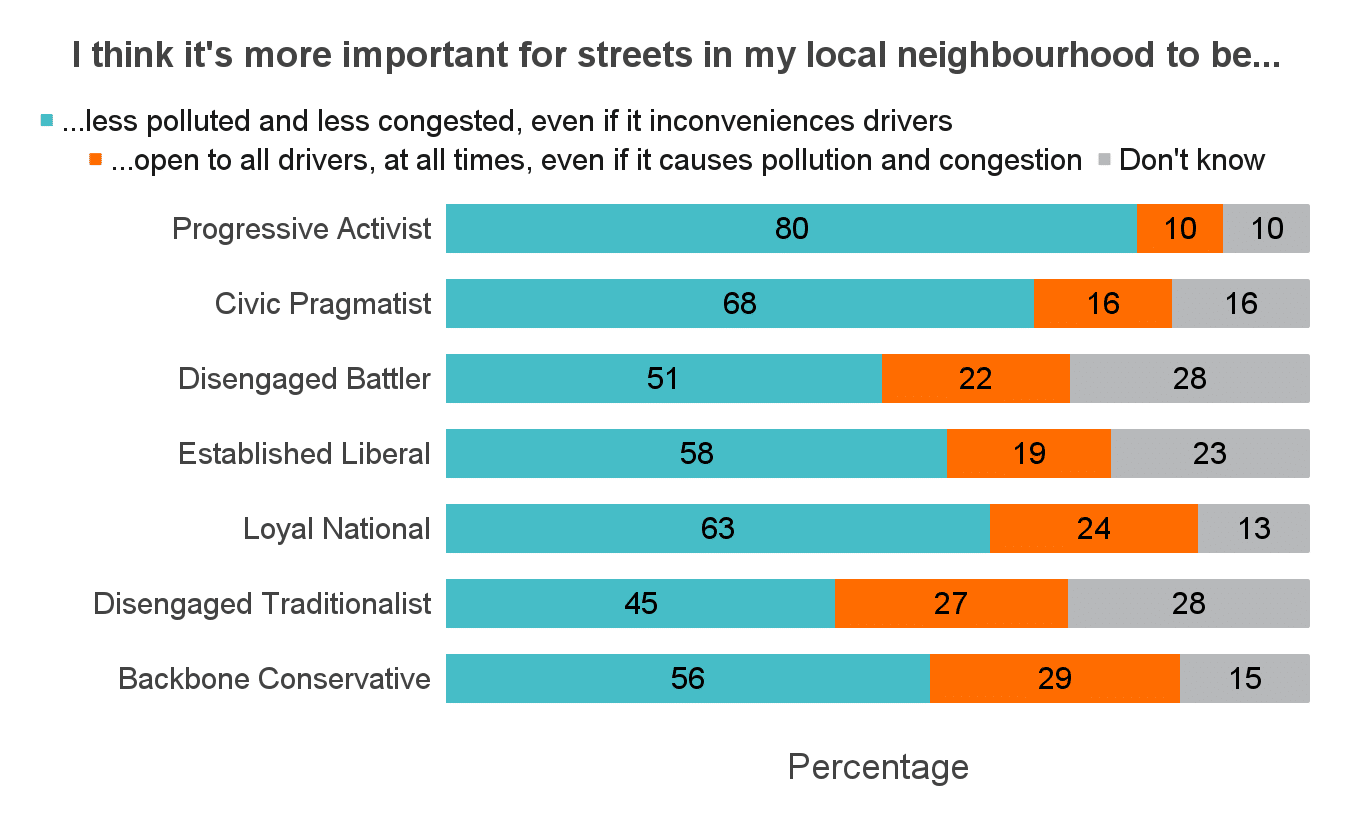Established Liberals
Who are Established Liberals?
(14% of the British public)
Characterised by their comfortable, trusting and untroubled perspective, linked to their financial security, Established Liberals tend to hold right leaning views about the economy, but nonetheless tend to skew towards the left on social/cultural issues (expressing pride in the diversity of the country) and are characterised by their comfortable, trusting and untroubled perspective, linked to their financial security.
Of all the segments, they feel the least threatened or vulnerable, are firmly meritocratic (believing people tend to get what they deserve in life) and are among the least likely to agree that the country is getting worse.
The table below highlights what an ideal UK looks like for this segment, as well as the issues that are most important to them, the messengers they trust, and their preferred news sources.
| Ideal UK | Most important issues (Feb) | Most important issues (Sept) | Trusted messengers | Most read news sources | |
|---|---|---|---|---|---|
| 1 | Tolerant | Healthcare and the NHS | The economy | Climate scientists | BBC |
| 2 | Hard-working | Britain leaving the EU | Healthcare and the NHS | David Attenborough | BBC Radio 4 |
| 3 | Environmentally friendly | The environment and climate change | Britain leaving the EU | Environmental charities | ITV |
Found predominantly in rural areas and the south-east, they are high earning with a global outlook that is likely to be driven more by professional networks than a sense of solidarity with disparate communities around the world. They are firmly pro-European, with a strong lean towards voting Remain in the EU referendum. They are the least likely to be worried about their economic status and job security during the Covid-19 pandemic.
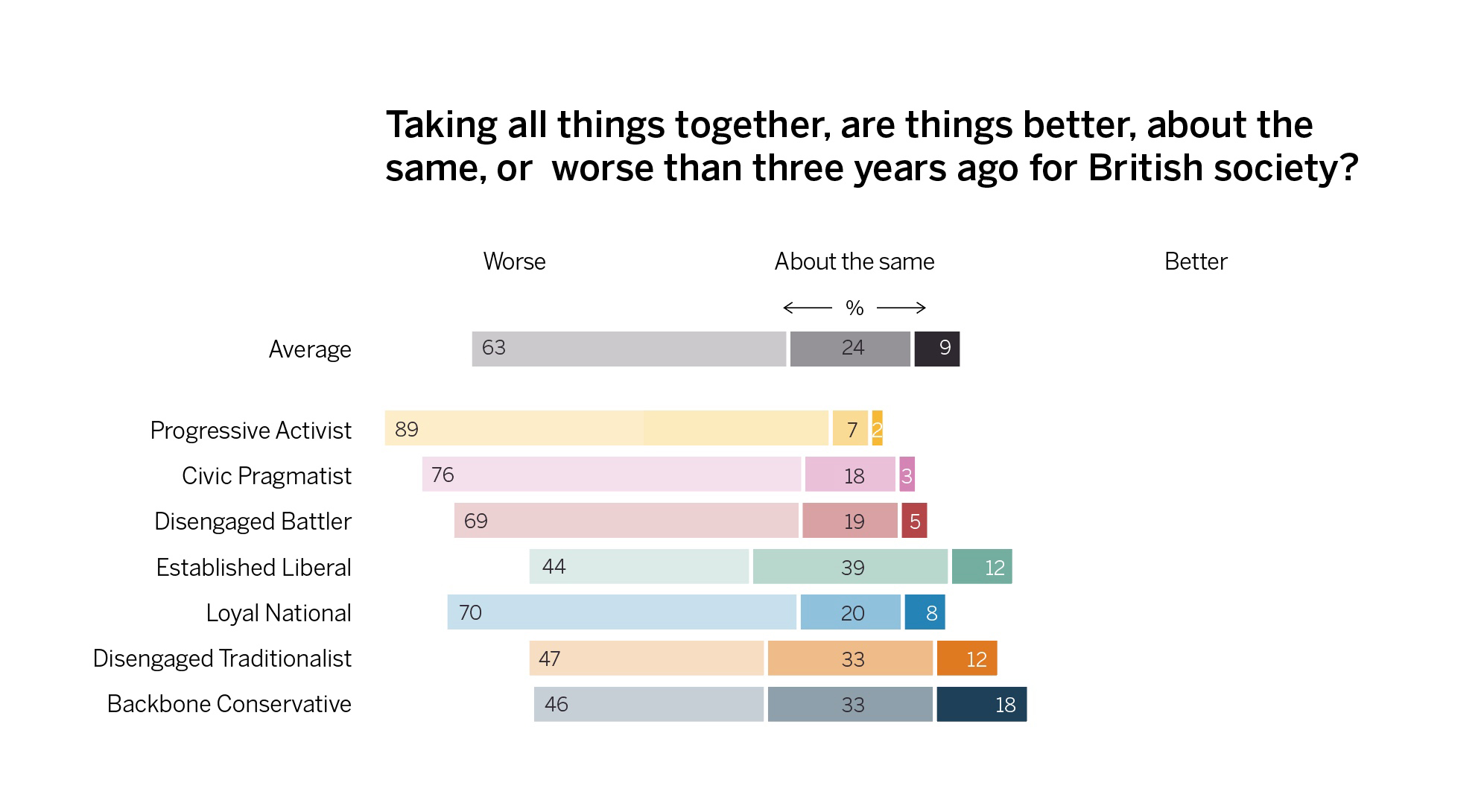
Views on whether British society is better or worse than three years ago, across segments
This segment is proud of cultural diversity, freedom and equality, and 60% say that immigration has had a positive impact on the country.
I am Black; I wake up that way every day. I say I am British and I think one of the great things that Britain offers is because of the variety of people that live here, and actually the way we mix is just very different from other countries.”
...learning more about different people and how different people live, there’s a lot of that in the UK, which is an interesting mix of cultures and people and everything else. One of the things I do like is meeting different people and understanding different people.”
I put on my Western hat and I think differently, and I put on my Eastern hat and think again. I compare the two views and then I take an appropriate action.”
With an aversion to the negative stereotypes of national identity, this segment is more likely to view themselves as internationalist, and the most likely to think left/right labels are irrelevant.
It's a strange one because saying I’m proud to be British sometimes has negative connotations, doesn’t it? You don’t want to come across as ‘keep Britain British’ kind of thing. I don’t think I would say to someone, ‘I’m British’ when first introducing myself … for me, a massive part of my identity is being a mum. I don't think that makes anything else I do less.”
Established Liberals feel the most politically empowered of all the segments, with 43% feeling that they have a say politically (25% average). They are also the most likely to feel part of a community and to agree that people can be trusted, and are the least likely to say that the world is becoming a more dangerous place.
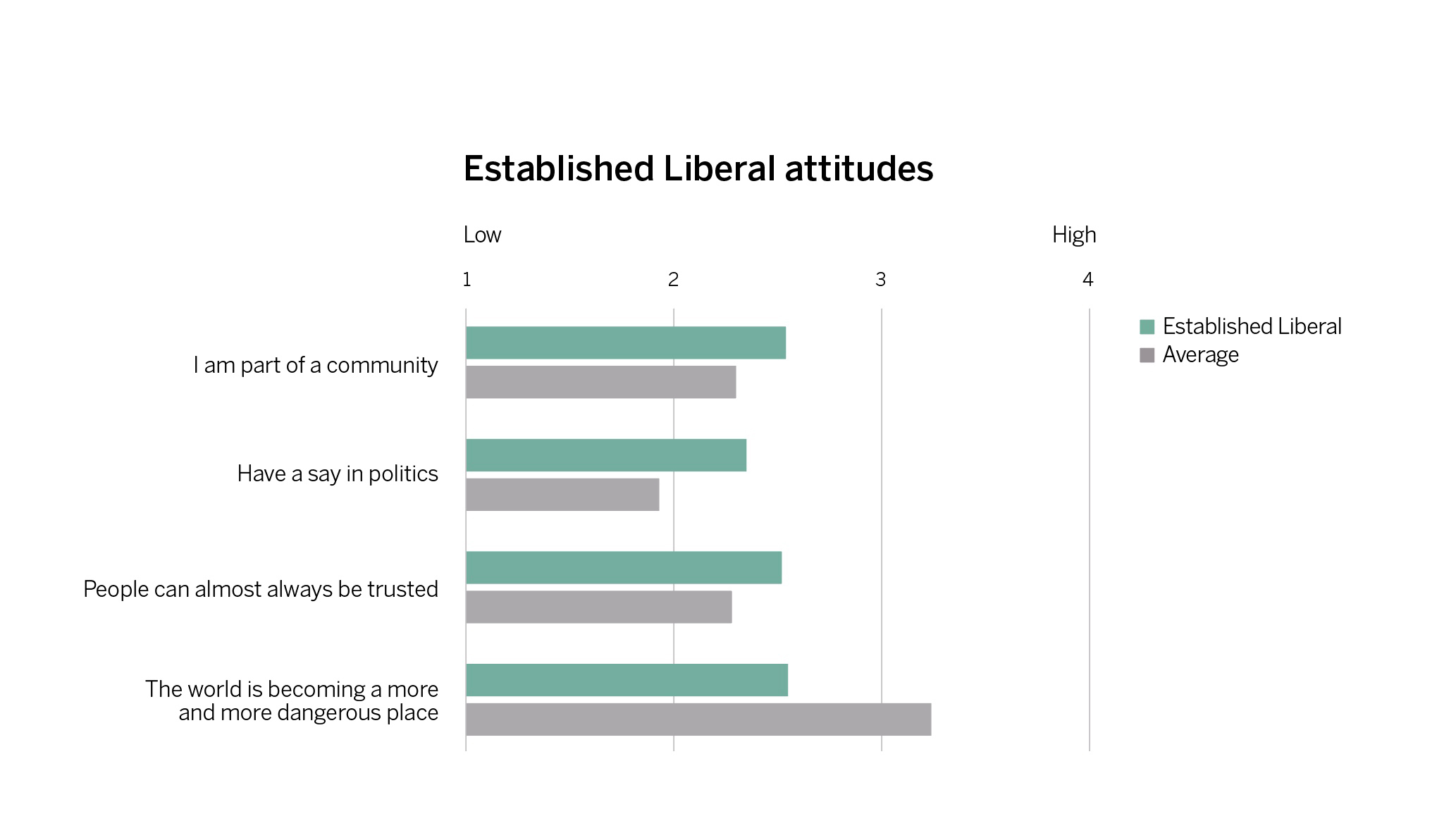
Established Liberal views about society, 1 = low level of agreement, 4 = high level of agreement
A strikingly optimistic segment, when asked about how they feel about the UK during the Covid-19 crisis, this segment (fairly uniquely) was generally positive. They are by far the most likely to agree that we look after each other (74%, compared to 61% average), as opposed to it’s everyone for themselves (10% compared to 25% average), and are in strong agreement with Backbone Conservatives that our response to Covid-19 has revealed the best of human nature (64%, compared to 53% average) .
I’m going to say hopeful. I’m quite an optimistic person and I think it won’t be too long until things are better. I know a lot of people have died and they’re ill and that is awful but I think we’re crossing the peak and I think brighter skies are in front of us.”
I don’t feel apprehensive. I feel that I don’t know what tomorrow may bring, but in real life we never know what tomorrow may bring, it’s just that we think we do. So I think what I have noticed are people coming together for the greater good, we’ve got a lot of people volunteering, doing things that we never expected. So I think that there is a feeling of we’re all in this together, but I think most people are trying to do their best to make it as good a situation as possible.”
Established Liberals value compassion and compromise (the most of any segment), and are highly civically engaged (on a par with the Civic Pragmatists), regularly volunteering and giving money to charity. Seeking a country that is tolerant, empathetic and environmentally friendly, they are the most likely by a long way to believe that the differences between people in the UK are not so big that we cannot come together (80%, compared to 57% average), although their positive (arguably even rose-tinted) view of the world has its roots in their significant privilege relative to many other segments.
I think it’s important to hold on to traditional values, but it’s also equally important to be open to changes that might actually improve the whole of society and yourself.”
Established Liberals on climate change
Their comfortable economic position, left-leaning views on social and cultural issues, strong institutional trust and sense of personal/collective efficacy make this segment a critical audience for climate change narratives. Established Liberals fall in the middle of the segments in terms of worry about climate change (22% are ‘extremely worried’, 38% ‘very worried’). Although some organisations’ conservation and wildlife protection messages are well-tuned to this segment, there are arguably missed opportunities in using those to mobilise them, and their economic weight and social standing, behind climate action.
Many of us are in respectable jobs and we can influence a lot of people. Usually a change only happens with social habits, because you tend to be a member of a group – for example, a church, a sporting group – and if people tend to have the same objectives, then they will start making a change in that group, but then they will also be part of other groups and so on. So it’s a domino effect as one thing leads to another and soon could become a mass movement. All the big events that have happened through history have happened because one small thing has triggered it, but then the rest of the people have embraced it. That’s what we need, a small change, but exponential change, with each of us trying to take our own responsibility.”
You’ve got an individual power to make consumer choices, you’ve got the power to lobby those who you consume from, that you can lobby companies, and if you get enough people band together they will make changes ... you’ve got the power as an individual to vote for parties that you think will achieve a change that you’re looking for.”
Despite their strong civic engagement, only 16% of Established Liberals would vote based on a party’s climate policy, and even fewer say they sign climate change petitions (13%). Climate change and the environment dropped out of this segment’s top three priorities between February and September 2020, as concerns about Covid-19 and the economy took centre stage. In common with all segments, apart from Progressive Activists, there is no sign of this segment taking part in a climate protest/march (0%). This is in contrast with an issue like Brexit, where marchers at the very large demonstrations against leaving the EU were stereotyped as being predominantly from this kind of social/political grouping. In this case, it appears climate change is not an issue that incites activism. This could be because Established Liberals are not yet persuaded that it will affect them personally, and soon.
When you have your life to manage and you’re busy and you don’t have that much free time, it’s hard to sacrifice that to do any sort of activism. So, what I concentrate on is what I can do from home, trying to lessen my carbon footprint. Carbon footprint was a big topic in the last few years. And now, obviously, the big thing is about single-use plastics. And that’s something that I try to concentrate on doing in our household, reusing things that we can, buying recyclable products, making sure that we recycle everything that we use when we can. I think that making small changes like that can go a long way if you don’t have the time or inclination to do any activism, go on any campaigns or strikes.”
I think with the whole Greta Thunberg thing, I was talking to an older person recently and they said, ‘would you have gone on strike? Would you have missed school for that?’ And I wouldn’t. Not because I don’t think it’s important but, I don't know, I just would rather be at school. That kind of thing. I don’t know if that’s bad but, obviously, I definitely think things need to be done but I don't know if a lot of people would sacrifice even a day of their lives to go out and strike for that.”
Established Liberals share some common ground with Loyal Nationals, who have a very different demographic and economic profile, and Backbone Conservatives, who are much further to the right politically but share a similar income bracket. On these three statements relating to ‘pulling together’ and ‘taking responsibility’ – critical for understanding the different segments’ starting points on climate change – these very different segments are in close agreement.
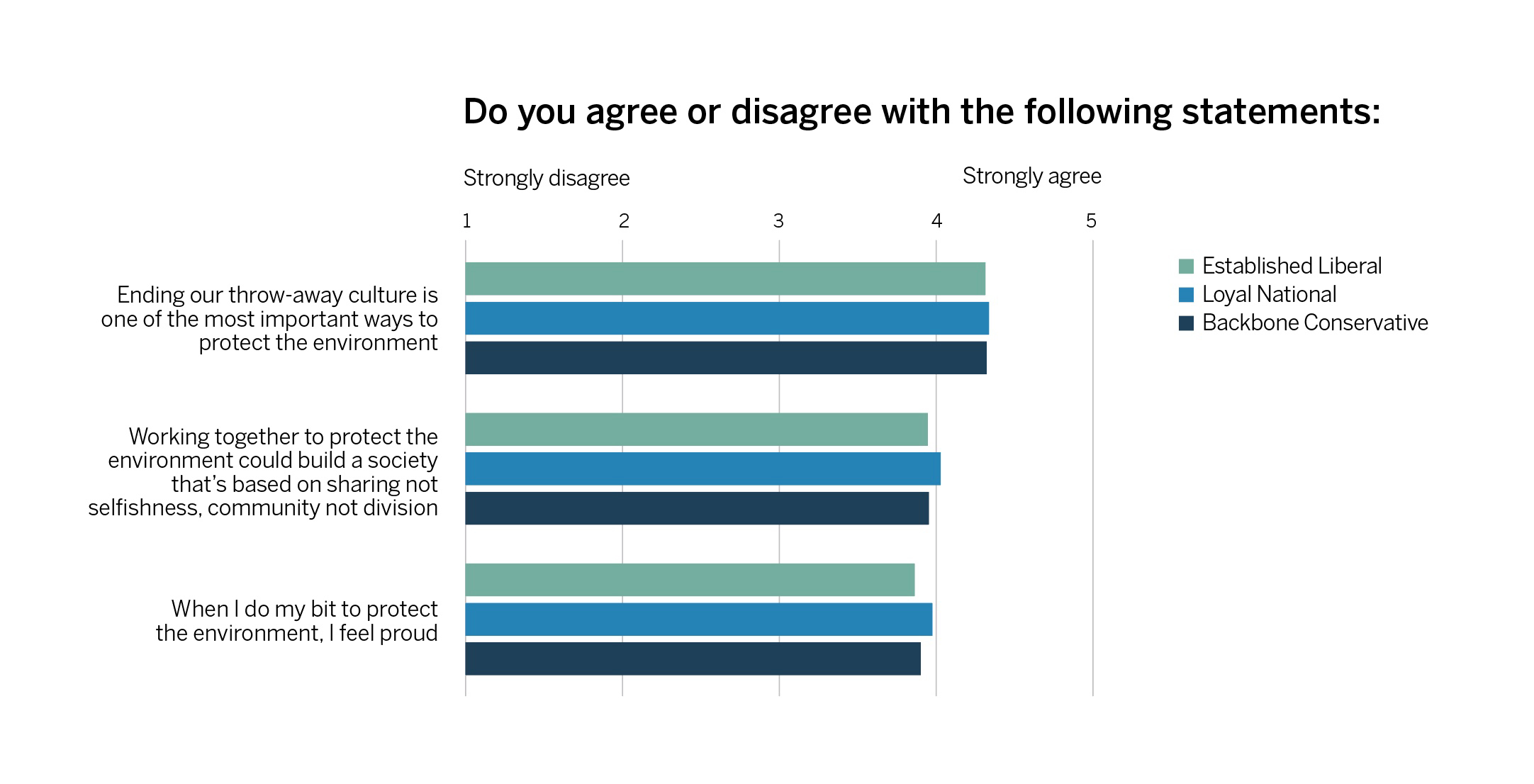
Established Liberals share common ground with other right-leaning groups
Net zero
Perhaps due to their socially liberal and globalist views, Established Liberals differ from other more right-leaning segments on topics such as fairness and net zero policies. Around 48% of this segment are concerned about how climate change may increase the suffering of the world’s poorest, and most think richer countries should pay to help poorer countries adapt to climate change (59% in support versus 21% opposing).
Established Liberals are relatively optimistic about net zero policies bringing about better jobs in green industries, and they are enthusiastic about retraining programmes for people to work in industries that do not rely on coal and gas. While they are committed to environmental protection and climate action, the economy is a priority concern, and some Established Liberals may not yet be convinced that net zero will be good for the economy.
Risk: Established Liberals feel they have to choose between the economy and the environment/don’t see net zero as a necessary condition for economic success.
Opportunity: Established Liberals see a successful role for Britain in the world, where those with the broadest shoulders do more to bear the burden in the fight against forces that do not respect borders (including climate change), and they see a role for themselves as champions of new green solutions.
Narrative recommendation: Net zero policies addressing the destruction of nature and biodiversity will sit well with Established Liberals, as well as policies that simultaneously protect the environment and the economy.
For Established Liberals, fairness is about ensuring equality of opportunity in our systems to ensure that people of different circumstances have an equal chance. What they do with that chance is up to them. As a result, Established Liberals favour implementing special rules to account for different levels of emissions over everyone playing by the same rules.
I think if people have individual needs. I mean, if you're physically disabled … I don't want to sound condescending but, you know, everybody should have their own opportunities to be the best they can be. You know what I mean? … And if that means you're never actually working, so be it. I think as a society we should be able to support that.”
Giving everybody the same opportunities and then it's up to the individual whether they take that opportunity and make something or decide, 'No, I can't be bothered' or, 'I don't like it,' or whatever.”
Established Liberals are among the most willing to change certain aspects of their lifestyle and may embrace the identity of being an early adopter of new green technology. Nearly half are open to changing their diets to reduce their impact on the planet. They fly most frequently out of all segments, but are also third most willing to pay a flight tax after their second or third flight.
Established Liberals are relatively knowledgeable about net zero, and are second most likely to identify the correct definition out of four possible answers (59% correct). In terms of net zero policies, the majority of Established Liberals are in favour of low traffic neighbourhoods, but to a lesser extent than other segments. While they believe it is fairer for lower income households to receive government support and tax benefits for environmental changes (such as replacing gas boilers, renewable energy, using electric vehicles and home insulation), Established Liberals believe it is also fair for higher income households to receive the same benefits and that everyone should pay road taxes and flight taxes regardless of income.
NEW: Climate policy support and involvement
Biggest Issues (after cost of living and NHS)
- Climate change & the environment
- Jobs and unemployment
- Crime
Most worried that climate change might…
- Harm nature and wildlife
- Increase the risks of floods
- Cause my bills and other costs to rise
Reasons to not participate in consultations
1) We should leave finding solutions to climate change to the experts
2) I don’t enjoy discussing controversial issues with other people/strangers
3) I don’t trust MPs so don’t want to engage with them
Reasons to participate in consultations
1) It’s important that local people have a say in things that concern their local area
2) I see it as part of doing my bit to combat climate change
3) It’s nice to hear others’ opinions and discuss with them
Three ways to engage Established Liberals in climate policy change
- Address practicalities: Established Liberals are the first to ask practical questions and need to feel that new technology is a good deal. Make action common sense and the smart thing to do.
- Highlight wider economic benefits, for example of renewable energy: Established Liberals are less supportive of climate policies that they feel will negatively impact the UK’s economy.
- Highlight what the experts say: trust is relatively higher for this segment and they are interested in knowing what experts think.
See the Seven segments 2024 overview here.
Established Liberals feel positive about expanding renewable energy
Policies that increase use of renewable energy, such as solar and wind farms, are viewed positively by this segment and seen as most important for the government to prioritise.
It's [installing wind turbines] just like solar panels, isn't it? They look odd when you first put it on your house roof, you're like, oh, what is that sheet of glass around there? But then when you look at the benefits of it, you're like, yeah, I don't mind.”
Established Liberal, Surrey
Along with this; protecting nature and the environment, reducing emissions from heavy industry and reducing air pollution are environmental issues that Established Liberals see as important for the government to prioritise.
Many other issue areas are seen as less important for the government to prioritise among Established Liberals. Including; reducing exploitation of oil and gas in the North Sea, supporting farmers to use nature-friendly practices, reducing emissions from air and road travel, and ensuring reliable public transport.
Optimism and positivity around renewable energy and new technology now comes with real practical concerns
Established Liberals are traditionally the segment most optimistic about new technologies and advancements. However, as adoption of technologies such as electric vehicles has increased among this group, they now have real practical concerns about how climate change policies will be implemented.
“Things like the electric cars, it's all well and good saying it will be greener energy to use to run the cars, but they haven't looked at the lifespan of the batteries that they're then putting into the cars. It's just a knee jerk reaction rather than an effect that's going to be positive 5, 10, 15 years down the line.”
Established Liberal, Surrey
There's also no guarantee that the air source and ground source heat pumps are the most effective way of heating every home that there is. So what do you have to do? Spend all this money on them and hope that it's effective and cost effective for your property? Or again, are they going to look into all the options before they force it on us and the chances are they're going to force it on us..”
Established Liberal, Surrey
As Established Liberals are often on the forefront of the green transition, and yield relatively high political and cultural power, it is crucial that these practical concerns can be addressed.
Established Liberals are more relaxed about the pace of big changes
In focus groups we heard this segment being slightly more relaxed about the urgency of climate change action. While Established Liberals are generally motivated by the need to tackle climate change, their high levels of comfort and low threat perception means they are more relaxed about the pace of change, and less convinced by calls for radical or rapid changes.
For me it's [climate change] more in the future rather than what we are now. The cost of living is now, NHS waiting times are now, where obviously the climate is probably a few years down the line. That's probably why it's not as big on my priorities now as what it should be.”
Established Liberal, Surrey
I think I would do away with these dates. Like we said, for example, the electric cars are having to change by this date because it's not going to happen. We've already seen it pushed back once. You effectively are kind of losing faith in them [the government] because you are thinking, well actually they've already said it was going to be done in 2025. They've now pushed it back to 2027. It's now going to be 2030 and actually is it going to happen? So it's better to not have the expectations set and just kind of have ‘an in the future’ date. That would be my big thing [to do differently on tackling climate change].”
Established Liberal, Surrey
Engaging Established Liberals
Motivated by arguments about economic and societal progress and opportunity, use their comfortable and influential position in society to bolster the case for commonsense, low-carbon solutions that build on positive steps already taken.
Key takeaways
Tell an authentically positive and forward-looking story
As the most optimistic segment, stories about how terrible climate impacts will be or how badly the UK is doing on its climate policies are unlikely to be the best starting point for Established Liberals. Instead, as a financially comfortable segment with confidence in technological progress, emphasise how a low-carbon future will build on the successes we have already achieved as a country.
Emphasise the ‘rational economics’ of climate policies
To Established Liberals, political decisions can seem like a failure of logic: for example, why would I vote to leave the European Union, which is an exemplar of political and economic liberalism? In the same way, they undertake some personal low-carbon actions not for idealistic reasons but because they understand the benefits. Talk about the economic logic of climate policies to engage this group’s sense of rational analysis, which they are proud of.
Frame the green recovery as a sensible return on investment
Don’t assume their financial security means they will automatically support government spending on climate policies if they cost more in the short-term. Support for a green recovery has increased, but this needs to be framed as an approach that generates a better return on our investment, connected to green global growth. Use their cultural capital, appealing to their progressive values, civic-mindedness and internationalism, to ramp up and make visible support for high-impact green policies.
Build the coalition around food/farming
Established Liberals are already reducing their meat and dairy intake, but are likely to be doing so with a view to eating better and supporting local producers. Their desire to protect farmers’ livelihoods and conserve the natural landscape suggests a useful coalition with Backbone Conservatives.
Continue exploring
Sign up to our newsletter
Thank you for signing up to our newsletter
You should receive a welcome email shortly.
If you do not receive it, please check your spam folder, and mark as 'Not Spam' so our future newsletters go straight to your inbox.


